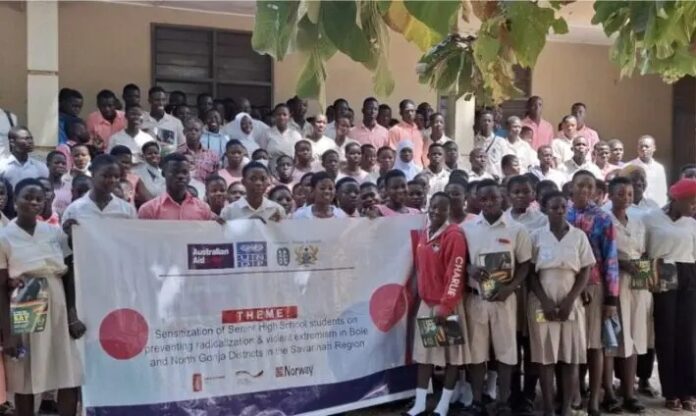The Savannah Regional Peace Council has sensitized youth in tertiary and second-cycle schools in the region to raise awareness about the risks and vulnerability factors associated with violent extremism and radicalization.
The initiative aimed to empower the youth to actively support efforts to combat violent extremism and radicalization in the country.
This effort is part of a broader initiative to counter and prevent violent extremism in the region, which shares a boundary with the Sahel—a region known for terrorism and violent extremist activities.
Students from Bole Senior High School (SHS), Bole Nurses and Midwifery Training College, Savannah College of Education, and Daboya Day SHS were among the beneficiaries of this initiative.
The program was implemented with support from the United Nations Development Programme (UNDP) and development partners, including the Norwegian Embassy, the Embassy of Denmark, Australian Aid, and the German Development Cooperation.
Reverend Father Lazarus Annyereh, Chairperson of the Savannah Regional Peace Council, led the facilitation team to visit the schools. He emphasized the need for youth to become active players in the fight against violence and the operations of violent extremist organizations.
He highlighted that unresolved conflicts, discrimination, marginalization of minority groups, and harsh economic conditions are critical push factors for radicalization.
Father Annyereh urged the youth to remain vigilant and not allow themselves or others in their communities to be radicalized. He advised them to report suspicious activities to the appropriate authorities while ensuring their personal safety.
He added that knowledge is crucial in the fight against extremism, making such initiatives essential.
Mr. Kennedy Atiibo Ayatah, Executive Secretary of the Savannah Regional Peace Council, likened peace to individual health to help students grasp its importance.
He explained: “The way ill-health affects an individual is the same way violence or the absence of peace affects society. No matter what one has achieved, without health, it means nothing because they cannot enjoy it.”
Mr. Ayatah further emphasized that the absence of peace disproportionately impacts the youth, who often bear the brunt of violence. “They are usually the ones who go out to fight, losing their lives or becoming maimed. Violence also jeopardizes the prospects of a better future, which belongs to the youth more than the aged,” he stated.
He underscored that the youth play a critical role in peacebuilding efforts and encouraged the formation of Peace Ambassadors’ Clubs (PACs) in schools. Through these clubs, the Peace Council aims to nurture a new generation of peace advocates to ensure sustainable peace for the country and the world.
School authorities at Bole SHS and Daboya Day SHS welcomed the idea of PACs and committed to appointing patrons to facilitate the formation of the clubs in their schools.
ALSO READ:

